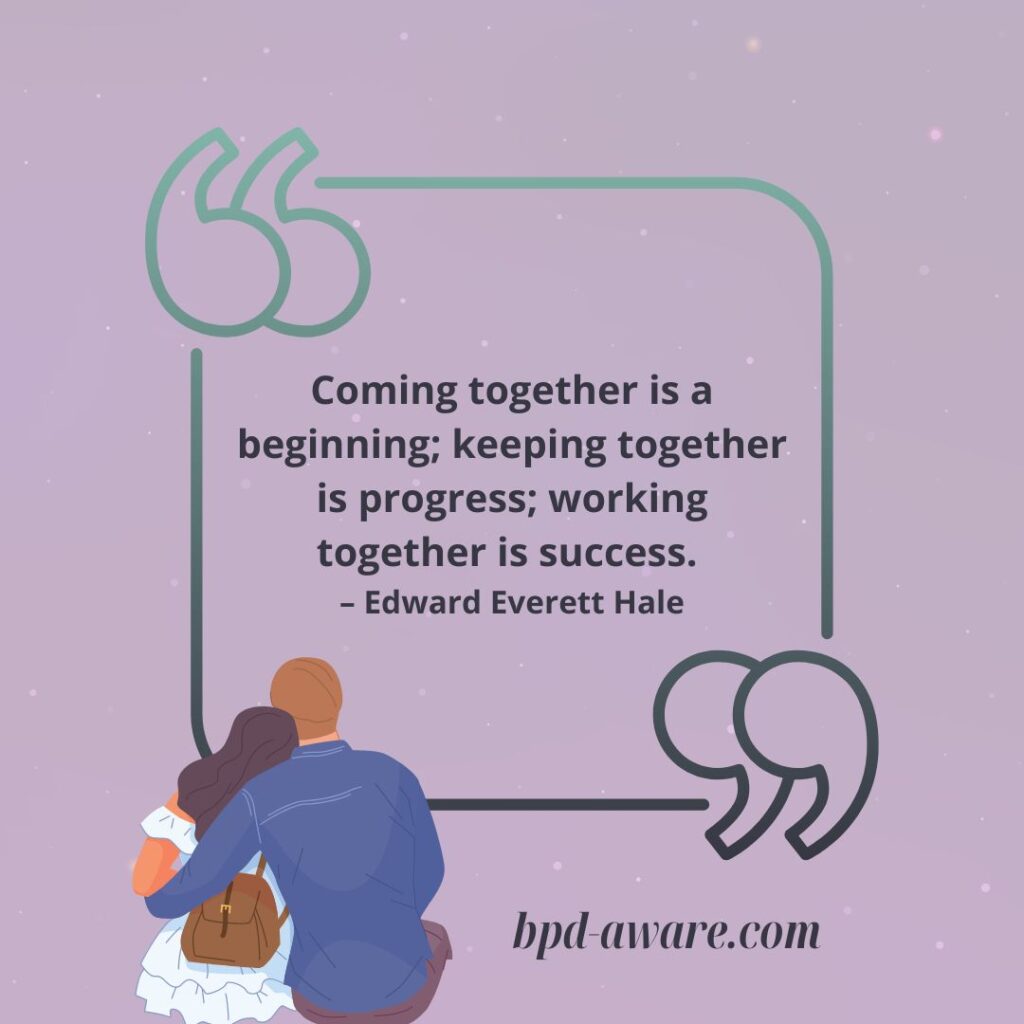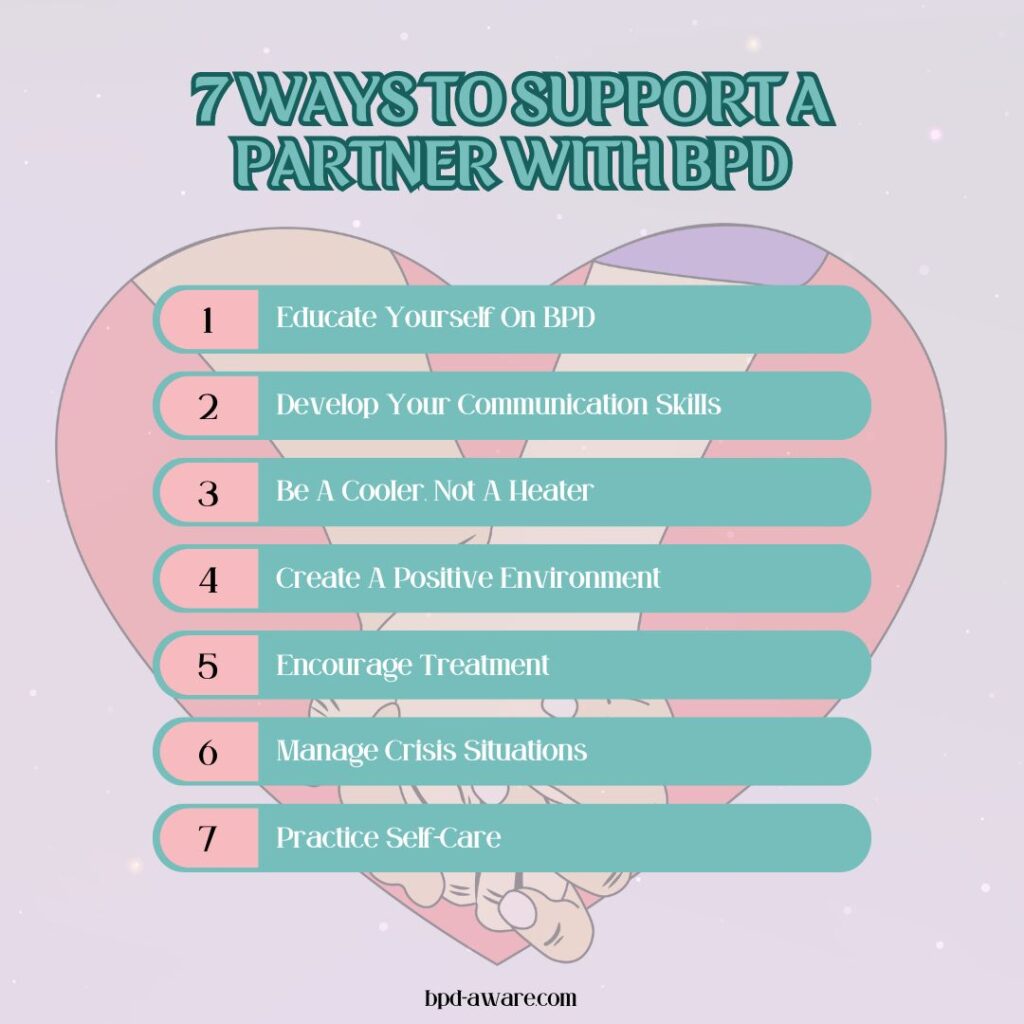Supporting a partner who has Borderline Personality Disorder (BPD) is challenging, without a doubt. There will be dizzying highs and terrifying lows. There will be moments where you doubt the relationship will make it and other times where you feel like your relationship is rock solid. Having a partner who has BPD isn’t for the faint of heart.
However, watching someone you love take the steps they need to improve can be immensely rewarding. It can bind you to them and strengthen your mutual love in a way that can’t be compared.
Whether you’ve recently found out your partner has BPD, or you’ve known for a while, it’s normal to wonder what you should be doing to support them as best as you can. After all, one of the marks of a loving relationship is wanting to help each other improve and succeed as much as possible. That’s why we will look at some of the best ways you can support your BPD partner in this article.
Educate Yourself on BPD
One of the best ways you can support your BPD partner is by educating yourself on Borderline Personality Disorder as much as possible. Educating yourself on BPD has never been easier. You can follow websites like ours, as well as others such as Talking About BPD and Soberish, where you can read real accounts of people’s experiences with BPD. Psychology Today also regularly posts articles about BPD that are more from the treatment side of things.
There are also a great number of books about BPD that cover the condition from almost every angle you can think of. There are books by therapists, books by sufferers, books by people with loved ones with BPD, and more. If you’re looking for some of the better books about Borderline Personality Disorder, you might want to read our list of favorites:
Learning about BPD doesn’t just have to be reading though. If you like listening to podcasts then there are some great ones to choose from like You and Me and BPD, Bold Beautiful Borderline, and From Borderline to Beautiful – all of which are free to listen to.
Finally, you have access to one of the best sources of information about BPD of all: your partner. Open up a dialogue with them and ask them how BPD affects them in general, how it’s affecting them right now, what they’re doing to improve, and what their treatment plan entails. By asking questions and listening to your partner’s answers, you’re not only educating yourself, but you’re also showing that you care about them and their experiences. People are often scared to ask others about their mental health which only adds to the stigma.
If you don’t know what sort of questions you should ask, we have an article with some pointers here: Questions To Ask Someone With BPD To Better Understand Them
Develop Your Communication Skills
Communication is vital for the success of any relationship, but that can be particularly true when you’re in a relationship with someone who has BPD. There will be times when they’re in a dark place and they might try and shut you out. It might feel like they don’t want to be with you anymore and that the relationship is breaking down. This is rarely true though. It’s usually just a short-term blip that can disappear as fast as it appeared in the first place.
But this is where communication is so important. Communicate your feelings and needs to your partner in a way that doesn’t criticize or blame them. People with BPD are hyper-sensitive to perceived criticism and, if they’re already going through a bad time, it’s best not to add to it.
Concentrate on using sentences that start with “I” rather than “You”, such as “I feel hurt when I hear harsh words during our arguments” or “I want to support you, so I need you to tell me how I can help.”
Likewise, setting boundaries can be extremely helpful. People with BPD typically have abandonment issues and/or unstable interpersonal skills which can result in some maladaptive behavior. These boundaries can be things like how you handle disagreements, how much time you both need for yourselves and how often you communicate. For more on the importance of boundaries in relationships with people with BPD, read our article: How To Set Boundaries With Someone Who Has BPD

Be A Cooler, Not A Heater
People with BPD live with their emotions turned up to eleven a lot of the time. That can mean a lot of conflict and arguments over small things. In these situations, it’s important to try and be a cooler and not a heater.
What do I mean by this? Think of someone with BPD as someone with a fire burning bright inside them. The last thing that fire needs is to have fuel thrown on it by you shouting at them, insulting them, or generally getting angry with them. Be a cooler and learn when to bite your tongue and not fuel the fire. If there’s an issue that needs discussing, it’s best to discuss it when your partner has calmed down and you can both talk about it reasonably.
Create A Positive Environment
By reinforcing and celebrating your partner’s positive behavior and achievements, you are providing them with a small hit of dopamine (the happiness hormone) that will boost their self-esteem and encourage them to keep on that path. These small wins can quickly become regular habits when you help your partner see the value in them. Things to encourage include healthy eating, getting enough sleep, exercising, getting out into nature, engaging in healthy hobbies, going to therapy, taking prescribed medication, and things of that ilk.
Another way to create a positive environment is not to bring your negativity into the situation. You might have had a bad day at work or an unpleasant conversation with a family member, but if you talk and ruminate about it for hours when you’re with your partner, it could completely crash their mood. That doesn’t mean that you can’t talk about your problems with your partner but it’s much better to frame them in such a manner as “Oh, this thing happened today. It really bummed me out but at least now I get to spend some time with you.” That way you can get your day off your chest quickly and offer your partner a compliment. This can be beneficial for your mental health as much as your partner’s as recent research indicates that ruminating on negative experiences can lead to depression.
Encourage Treatment
Treatment is incredibly effective for people with Borderline Personality Disorder and can offer serious improvements within a year. While you obviously can’t push your partner into treatment, you can certainly encourage them to give it a try, if they aren’t already. If they seem hesitant to seek treatment, ask them why. They may have perfectly valid reasons such as bad experiences in the past with therapy or they may simply not be able to afford it. Ultimately though, treatment is the best way to recover from BPD.
If your partner is already in treatment, you can continue to encourage this by being supportive of their efforts. Therapy can be a deeply private experience and your partner might not want to discuss the ins and outs of it, however, you can still ask basic questions like how their latest session went, how they feel they’re progressing, and so on.
In some cases, your partner might share certain skills or practices their therapist has recommended they try at home that you can be involved in.
Managing Crisis Situations
When you have a partner with BPD, be aware that crises can happen. These can include things such as extreme emotional distress, acts of aggression, and self-destructive behavior. Learn to recognize the warning signs that your partner is reaching a breaking point and have a plan in place if you can’t pull them back from this point. This plan should include things like contacting their therapist, calling a crisis hotline, or seeking emergency medical help. Hopefully, the plan isn’t necessary but it’s much better to have one and not need it than to need a plan and not have it.
Practicing Self-Care
Having a partner who has BPD can be emotionally taxing at times. It’s important to remember you are a person who has wants and needs too. You need to look after your own mental and emotional health, both for your sake as well as your partner’s.
Self-care means taking the time to look after yourself. That can mean different things to different people but basic self-care means getting enough sleep, eating a well-balanced diet, getting regular exercise, taking time to enjoy the little things in life, and so on. It can be easy to overlook the basics but they do make a difference.

Final Thoughts
Having a supportive, loving partner can make a huge difference to someone with BPD. I know because my wife was such a huge part of my recovery process. She wasn’t perfect, but she always tried her best and learned from her mistakes, and I was able to recognize that, even when times were tough.
By offering your love, support, and care, you can help your partner on their journey to recovery. Seeing someone you love get better and make a recovery is immensely rewarding and will fill you with a huge sense of pride, both for yourself and your partner.
Of course, things can get tough. Really tough. Not everyone is built to cope with having a partner with BPD, and not everyone with BPD will make a recovery. It’s important to be honest that not every BPD journey and relationship has a happy ending.
However, by educating yourself about BPD, developing your communication, having a cooler head, creating a positive environment, learning how to cope in a crisis, encouraging treatment, and practicing self-care, you give your partner and your relationship the best chance possible.
Sources, Resources, and Further Reading
- Supporting Loved One with BPD: Quickstart Guide: https://www.youtube.com/watch?v=71WEnPIyds8
- Supporting Someone with Borderline Personality Disorder: https://www.nami.org/advocate/supporting-someone-with-borderline-personality-disorder/
- How to Be a Good Friend to Someone With BPD: https://www.verywellmind.com/how-to-help-a-friend-with-bpd-425221
- Helping Someone with Borderline Personality Disorder: https://www.helpguide.org/mental-health/personality-disorders/helping-someone-with-borderline-personality-disorder
















